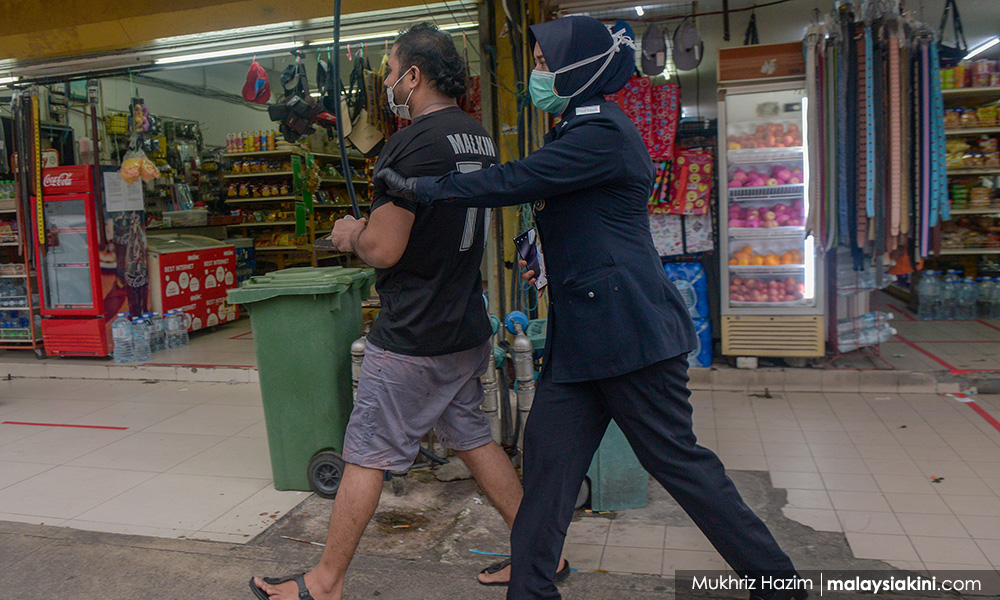LETTER | A criminal lawyer's perspective on the 'double standard'
LETTER | Nurulhidayah Abdul Zahid’s treatment leading up to her being charged is in sharp contrast with the treatment of other offenders that were suspected of having breached the movement control order (MCO).
She was never at any point during the whole process arrested, handcuffed or hauled off to the police station and kept in a cramped cell overnight with other prisoners waiting to be brought before a magistrate.
Nurulhidayah was instead politely requested to attend the police station to give a statement. Even then, such a request only came after she challenged Malaysians on the Internet to make a police report when there was a burst of outrage and disappointment on social media over what appeared to be a blatant disregard for the MCO on her part.
Regardless of what I might personally feel about Nurulhidayah and the statements she made leading up to her eventual plea of guilt, I’m not suggesting that she should have been handcuffed or thrown into a jail cell. The reason why I refuse to adopt such a position is because it would be akin to suggesting that those who have committed minor breaches of the MCO should be treated that way when in fact, such measures are often unnecessary.
Rather than punching upwards at these politicians or relatives of politicians that have received preferential treatment, perhaps we should take a moment to consider whether we should alleviate those at the bottom to the same level of treatment that Nurulhidayah has received throughout the entire process.
Instead of focusing our criticism on her RM 800 fine sentence, perhaps we should call into question why a 30-day sentence of imprisonment was initially meted out against B Lisa Christina, a single mother with barely enough money to settle the RM1,000 fine or why a seven-day sentence of imprisonment was given to a 22-year old student, who naively thought it would be a good idea to give a birthday cake to her boyfriend. While it was foolish for her to contravene the regulations, the student was still a first-time offender that had meant no harm.
I would caution against assuming that there is a conspiracy or intention to give preferential treatment to Nurulhidayah when there are various other factors that need to be considered, such as the fact that most of these cases were handled by different magistrates and different police officers.

Not only that, but there have also been more than 20,000 arrests since the start of the MCO, and the cases that are reported by the media tend to be those that are outliers from the norm, meaning cases which have excessive sentences.
Without the appropriate data set, such as the other sentences meted out by the particular magistrate that handled Nurulhidayah’s matter, it would be difficult to say for certain if she received preferential treatment simply because of her status as a politician’s daughter.
A 'systematic problem'
What we can say for certain, however, is that there have been huge discrepancies in sentencing across the board due to the wide sentence range that is available for a breach of the MCO (from a fine not exceeding RM1,000 to a maximum six months imprisonment or both). This has created a situation where people who have pleaded guilty for similar minor breaches of the MCO received sentences that vary greatly from one another.
Instead of pointing fingers at some imaginary authority figure and blaming that figure for the perceived double standard that exists in the criminal justice system, maybe we could take a different approach by first recognising that the existing double standard is a systematic problem that is caused by a lack of proper guidelines or training.
A majority of sentencing by magistrates is based solely on the recommendations made by the deputy public prosecutor (DPP), and the mitigation done by the defence. It is often a result of a completely non-transparent introspection exercise performed on the spot by the magistrate to reach a sentence that he or she feels is justified.
In cases where the accused pleads guilty upon being charged, the magistrate rarely elaborates upon the reasoning behind the sentence given. This is a big problem because different magistrates have different expectations of what an appropriate sentence is, especially in cases where the sentencing range can sometimes be quite wide.
As a result, the sentences received by two different individuals before two different Magistrate courts could vary greatly from one another despite both individuals having similar backgrounds and cases with a similar factual matrix.

'Request for the most severe form of punishment'
Rather than just relying on the recommendations of the DPP or the arbitrary "sentencing trends" compiled by defence lawyers, a proper set of sentencing guidelines for different offences prepared by a sentencing council is needed to help standardise sentencing across the board. This is something that can be practically done and other countries such as the United Kingdom have already laid the necessary precedent for its implementation.
While some may argue that a good defence lawyer should be able to sway the opinion of the magistrate in the client's favour and as such there is no need to worry. I would say that relying solely on the skill of a lawyer is a risky gamble, and there would be instances where the skill of a lawyer, no matter how great, would make little difference to the opinion of a particular magistrate.
By having the proper sentencing guidelines, we can avoid situations where accused persons without legal representation receive disproportionate sentences because they do not know how to perform mitigation.
Sentencing guidelines, such as those that have been created by the UK for a wide variety of offences, should also list out the relevant bands according to the levels of seriousness of the offence and provide a table of aggravating and mitigating factors to be taken into consideration. These tables would also list out the necessary factual scenarios that would fall either under the category of an aggravating factor or mitigating factor.
Another point to note on sentencing is that DPPs should be more thoughtful about the specific circumstances of each victim and not just quote the infamous line that I often hear in court: “Saya memohon hukuman yang setimpalnya” (I request for the most severe form of punishment).
DPPs should be more mindful about making such pleadings to the Magistrate. While I understand that DPPs at the lower courts may be desensitised and burnt out by the sheer amount of cases that require sentencing per day, it is no excuse to simply request for the maximum sentence or a heavy sentence without good reason.
Is retribution or deterrence the only purpose?
The preparation of pre-sentence reports by experts in cases with the likelihood of a custodial sentence can also be looked at further. The pre-sentence report, which details the background of the accused, his previous convictions, and the appropriate sentence to be meted out would certainly help ensure some form of accountability when it comes to sentencing.
Trust is an important commodity that is needed to ensure the continued operation of the criminal justice system, and it is important for us to ensure that the faith of the public in the system is upheld. Yes, we may argue for a change of mindset amongst Magistrates and police officers, but those aspects remain difficult to measure and even harder to control.
Rather than being stuck in a constant loop of talking about change but not seeing any, we need to offer more practical solutions to tackle this perceived double standard that perpetuates the criminal justice system.
I also urge criminal practitioners to come forth and have the necessary discussions about the problems that exist within the criminal justice system and how we can resolve it. We owe a duty to the public as practitioners with specialised knowledge and experience about the field to voice out on the issues that the public might not necessarily be aware of.
The purpose of sentencing in general also needs to be thought out, and we need to ask ourselves whether retribution or deterrence is the only valid purposes of sentencing or if there are other purposes that are more beneficial and in line with our modern narratives such as rehabilitation or restorative justice.
GOH CIA YEE is a criminal lawyer.
The views expressed here are those of the author/contributor and do not necessarily represent the views of Malaysiakini.
RM12.50 / month
- Unlimited access to award-winning journalism
- Comment and share your opinions on all our articles
- Gift interesting stories to your friends
- Tax deductable
